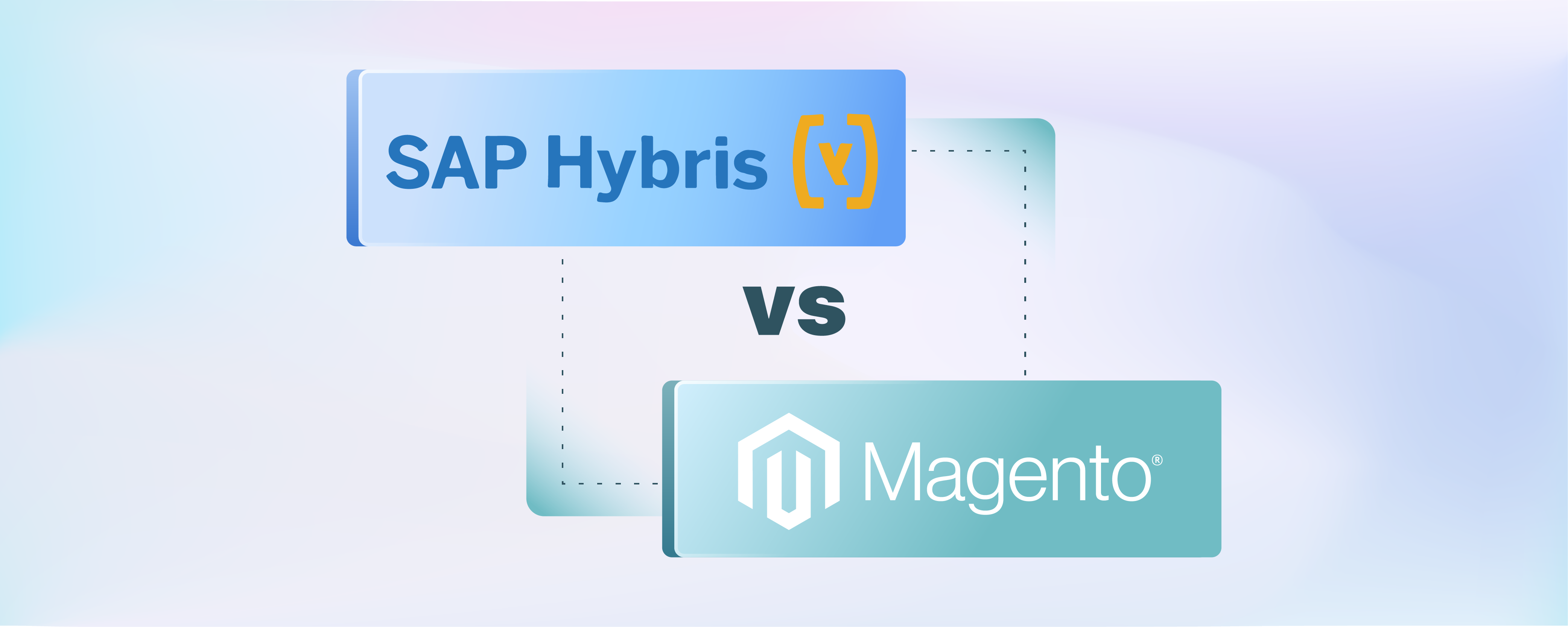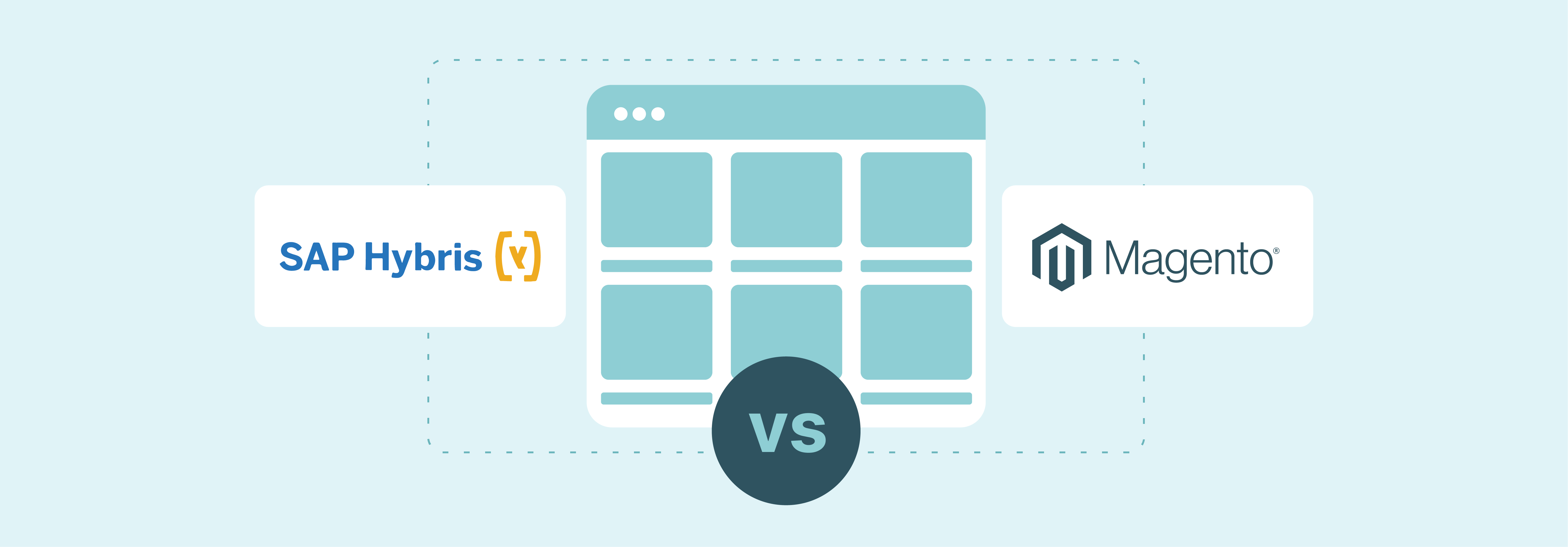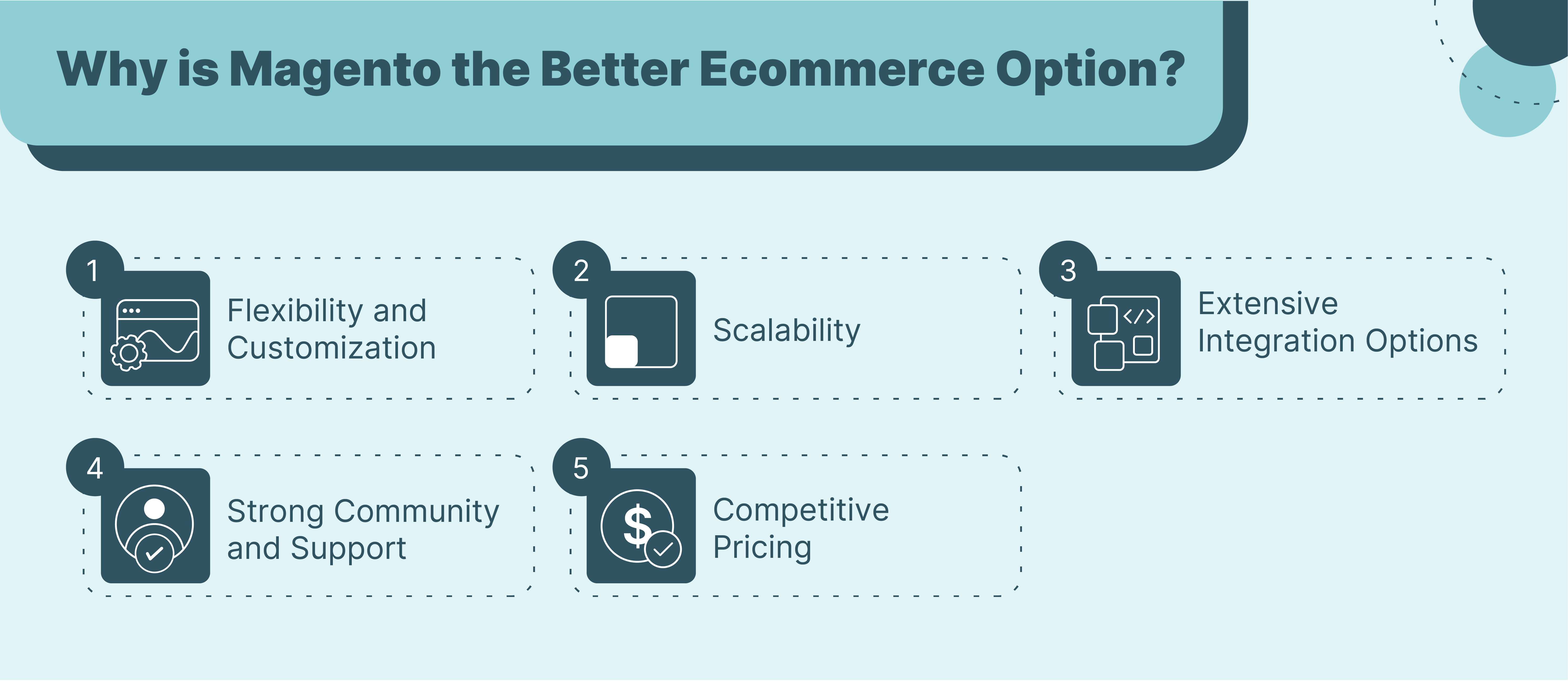
SAP Hybris vs Magento: Which is better?
Choosing between SAP Hybris and Magento? The SAP Hybris vs Magento analysis will help you choose the right one for your store. Magento offers flexibility for businesses of all sizes. SAP Hybris focuses on large enterprises. This article covers their key differences to help you choose the right one.
Key Takeaways
-
Understand the key differences between SAP Hybris and Magento.
-
Learn which platform is better suited for your business size and needs.
-
Discover the pros and cons of each ecommerce solution.
-
Find out why Magento is the leading choice for most businesses.
SAP Hybris vs Magento Overview

Magento and SAP Hybris are two prominent ecommerce platforms. Magento is an open-source platform that offers flexibility customization and scalability.
Over 250,000 merchants use Magento across 172+ countries. This makes Magento a popular choice for businesses of all sizes.
SAP Hybris is an enterprise-level ecommerce platform. It provides a comprehensive suite of tools for managing large-scale online stores. SAP Hybris caters to the complex requirements of large enterprises. It offers seamless integration across many channels. It has a customer base of 4600+ in 97+ countries.
Magento vs SAP Hybris Comparison
| Magento | SAP Hybris | |
|---|---|---|
| Definition | Magento is an open-source PHP-based ecommerce platform. It offers flexibility customization options and digital marketing tools. Magento provides online merchants with a flexible shopping cart system. It gives total control over the look content and functionality of their online store. Magento accounts for 31.4% of the top 100,000 ecommerce sites. | SAP Hybris is a cloud-based omnichannel commerce solution. It focuses on delivering ideal customer experiences. SAP Hybris is part of a large family of SAP products. These products work together to provide distinct customer engagement. SAP Hybris enables real-time analysis of customer behavior. It helps large organizations cut costs save time and reduce complexity. |
| Businesses/Brands Using Magento or SAP Hybris | A wide range of businesses and brands use Magento. These include Coca-Cola Ford Nike Olympus and Warby Parker. It is suitable for companies looking to sell products with lower costs and average order values. Magento is ideal for B2C online marketplaces. It has an ecosystem of over 150,000 developers and 300+ professional solution providers. | Large organizations prefer SAP Hybris. These organizations have revenues between $1M-$10M. SAP Hybris is used by global enterprises such as Samsung Adidas Vodafone Volkswagen and Carlsberg. These companies use SAP Hybris to power their applications. They deliver excellent customer experiences across various channels. These channels include B2B B2C and merchandising. |
| Integration | Magento offers a wide range of integrations. These integrations are available through the Magento Marketplace. Developers can easily create new apps and plug-ins. They can install extensions without compatibility issues. Popular integrations include TaxJar Bronto Avalara's AvaTax and Instant Search. Magento also supports various payment gateways shipping providers and marketing tools. | SAP Hybris has limited integration options compared to Magento. The available integrations include CSV SAP CRM Data Hub ERP and ImpEx. It may be a limitation for businesses. These businesses require a wide range of third-party integrations. They need these integrations to extend the functionality of their ecommerce platform. |
| Features | Magento offers a drag-and-drop content creation tool. It provides multiple storefronts for companies with various business lines and brands. Magento supports a wide array of payment methods. It also provides built-in marketing and SEO optimization tools. Magento is mobile-friendly and offers advanced order and product management. It provides stellar customer service. Magento's advanced business intelligence helps drive better insights and results. It does this through data aggregation analysis and visualization. | SAP Hybris features audience segmentation. It allows businesses to tailor campaigns and offerings in real time. It does this based on customer preferences. SAP Hybris also offers dynamic customer profiling. It helps map buyer journeys interests and purchase behaviors. It is used for trend modeling and product recommendations. Other features include advanced loyalty solutions product content and catalog management. You can also use versatile document management and SalesForce automation. SAP Hybris provides online support through community forums video tutorials and a help platform. |
| Pricing | The cost of a Magento license starts from $20,000. However implementation for an enterprise-level client may cost up to $100,000. The total cost of ownership for a Magento 2 ecommerce platform is approximately 50% less than other platforms. The pricing makes Magento a more cost-effective solution for businesses of various sizes. | SAP Hybris does not have fixed pricing plans for its base platform. The overall cost depends on the modules included and the edition. These editions include standard professional enterprise or limited access. The entry point for SAP Hybris starts from $100,000 per year for subscriptions. It also starts at $50,000 per license. SAP Hybris makes it a more expensive option than Magento. SAP Hybris is better suited for large enterprises with higher budgets. |
Magento Pros & Cons
| Pros | Cons |
|---|---|
| Open-source platform allows customization. Businesses can tailor the platform to their needs. | Enterprise and Premium versions are expensive starting at $14,420 and $49,990 per year respectively. |
| Enables buyer segmentation based on demographics and buying history. It also segments on the basis of user activity for targeted marketing. | Flexible architecture makes customization time-intensive requiring significant resources. |
| A strong community of developers and partners provides support extensions and resources. | Relies on third-party hosting necessitating a reliable Magento hosting provider. It should meet performance security and scalability requirements. |
| Mobile-friendly ensuring a seamless experience across devices. | |
| Rich features include multiple storefront management multi-language and multi-currency support and SEO friendliness. | |
| CMS enables the creation and management of multiple online stores from a single panel. |
Hybris Pros & Cons
| Pros | Cons |
|---|---|
| Central Order Management System streamlines order processing and fulfillment across channels. | Smaller community compared to other platforms like Magento. It results in fewer resources and support options. |
| Integrates with other SAP products allowing businesses to leverage a full suite of solutions. | Expensive integrations start at $50k which may be a barrier for some businesses. |
| SAP Hybris Sales solutions help businesses engage customers dynamically in ever-changing markets. | It has an efficient platform with complex features. Hence hybris results in a steep learning curve requiring intensive training. |
| Consolidates management of multiple business models channels and markets in one system. | Customization is resource-intensive requiring significant time and money compared to Magento. |
| Offers an omnichannel commerce experience providing a consistent customer experience across channels. |
Why is Magento the Better Ecommerce Option?

1. Flexibility and Customization
Magento offers unparalleled flexibility and customization options. Merchants have complete control over their sales channels. They can modify content design and functionality to suit their needs. The open-source nature of Magento lets developers tailor the platform to their specific requirements. This level of customization is a key factor in Magento's popularity. It appeals to businesses of all sizes.
2. Scalability
Magento's architecture is designed to be highly scalable. It can easily accommodate the growth of an ecommerce business. This makes it an ideal choice for companies with ambitious expansion plans. The platform's agility and resilience allow it to handle increased traffic and sales volume. It does this without compromising performance. This ecommerce scalability is a significant advantage over SAP Hybris. SAP Hybris has a more rigid architecture.
3. Extensive Integration Options
Magento boasts a wide range of integration options. It far surpasses those offered by SAP Hybris. Magento has over 30 built-in integrations and numerous customizable options. It lets businesses connect their online stores with various systems and applications. The extensive integration capability enables merchants to streamline their operations. It also enhances the overall functionality of their ecommerce platform.
4. Strong Community and Support
Magento benefits from a large and active community. This community includes developers agencies and users. They provide invaluable support resources and extensions. These help merchants maximize the potential of their online stores. Magento offers comprehensive customer support. It includes 24/7 phone support live chat email support and a ticket submission system. The abundance of Magento agencies ensures that businesses can easily find experienced professionals. These professionals assist with their ecommerce projects.
5. Competitive Pricing
Both Magento and SAP Hybris have pricing structures that scale based on business requirements. However Magento offers more affordable options. The Magento Open-Source edition is available for free. The Magento Commerce solution starts at $25,000 per year. This competitive pricing makes Magento accessible to a wider range of businesses. It appeals to small startups and large enterprises. In comparison SAP Hybris has a higher entry point. Its prices start at around $54,000 per year.
FAQs
1. What is the difference between Magento vs Hybris?
Magento is an open-source platform ideal for flexibility and customization. SAP Hybris is a cloud-based solution designed for large enterprises needing complex integrations. Magento offers extensive integration options while SAP Hybris focuses on omnichannel experiences. Magento is more cost-effective for smaller businesses.
2. How do Magento and SAP Commerce Cloud cater to both B2B and B2C?
Both Magento and SAP Commerce Cloud support B2B and B2C ecommerce. Magento provides extensive customization for diverse business models. SAP Commerce Cloud offers advanced segmentation and real-time customer profiling. Magento is more flexible while SAP Commerce Cloud excels in enterprise integration.
3. What are the advantages of using Adobe Commerce Cloud over SAP Hybris Commerce?
Adobe Commerce Cloud built on Magento offers superior customization. It also offers a developer community. It provides extensive third-party integrations and scalability. SAP Hybris Commerce excels in complex enterprise solutions but is more costly. Adobe Commerce Cloud is more suitable for diverse business sizes.
4. How does Magento Open Source compare to SAP Hybris?
Magento Open Source offers a free flexible platform ideal for small to medium businesses. It supports extensive customizations and a wide range of integrations. SAP Hybris is a comprehensive solution for large enterprises with high budgets. Magento Open Source is more accessible and cost-effective.
5. Why is Magento considered a leading ecommerce solution?
Magento ecommerce is highly customizable and scalable catering to businesses of all sizes. Its open-source nature allows for extensive third-party integrations. Magento's strong community provides excellent support and resources. Dedicated Magento hosting makes Magento a preferred ecommerce solution for many businesses.
Summary
In the SAP Hybris vs Magento comparison Magento emerges as a more versatile and cost-effective solution. Its key benefits include:
-
Flexibility and customization options
-
Scalability to accommodate business growth
-
Extensive integration capabilities
-
Strong community support and resources
-
Competitive pricing for various business sizes
However, your choice depends on your needs and budget. Opting for managed Magento hosting enhances the performance and flexibility of e-stores.



